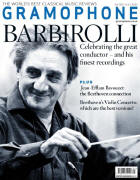Texte paru dans: / Appeared in:
|
|
 |
Outil de traduction (Très approximatif) |
|
Reviewer:
Rob Cowan Perhaps the most illuminating way to sample this remarkable set is to home in on three consecutive movements from the sombre-hued Fifth Suite, music written in scordatura with the A string tuned down to G. The growling, bass-heavy Courante (disc 2, track 15) defies its weight and manages to dance, while also admitting an exceptionally generous roster of colours. Here, as elsewhere in the Suite, and even in spite of its baritonal gruffness, Alisa Weilerstein calls on a varied tonal palette, reaching across a considerable dynamic range and employing subtle shifts in shading, articulation and expressive vibrato. In general her tempos are broader than the norm, certainly in the succeeding Sarabande, which clocks up a very expansive 5'28" (Yo-Yo Ma’s latest recording is a ‘mere’ 3'10", Steven Isserlis 3'55" and Emmanuelle Bertrand 3'53"); but its trancelike effect held me captive, especially in the second half of the movement when, as she approaches the repeat, she reduces her tone to a ghostly whisper. ‘The intrinsic impossibility of this music is the very source of its freedom’, writes Weilerstein on the disc jacket, and no single track proves her point more appositely. The magisterial first Gavotte that follows employs a stimulating mix of colours that’s similar to the one used in the Courante and that makes it eventful to listen to, while the swirling second Gavotte arrives in tempo. Other highlights include the Sarabande from the Fourth Suite which, for all its broad pacing (5'25"), treads its triple time with ease and nobility, reminding us that the dance’s name derives from the Spanish zarabanda. Bertrand’s swifter performance (4'03") is also appealing though paradoxically it’s Weilerstein who more evokes the image of a solemn but mobile procession. The tripping Courante is teasingly played, elegant and lightly bowed too, much as the Suite’s closing Gigue dances to the lilt of Weilerstein’s phrasing. The First Suite’s Courante is more playfully emphatic, whereas the opening of the Third Suite’s Prelude lands on a bed bereft of vibrato and the lively Courante seems to approximate the sound of laughter. The Prelude to the Sixth Suite on the other hand finds Weilerstein projecting her full, burnished tone evenly across all registers. So yet another superb digital set of the Cello Suites, one to place alongside Emmanuelle Bertrand, Alban Gerhardt, Steven Isserlis, Thomas Demenga and Yo-Yo Ma (his latest version). And Weilerstein’s special qualities? Her resolve to allow each movement of each suite to shine on its own terms. Hers is not an overview systematically imposed but more a way to facilitate the cycle’s immense expressive range piecemeal. Not that the best of her rivals don’t; but with Weilerstein you enjoy the sensation of being escorted through a Baroque dance hall by an all-encompassing commentator with a comprehensive under-standing of what she plays, be it the intensity of the Fourth Suite, the balletic grandeur of the Sixth or the tragic demeanour of the Fifth. She has all options covered, and Pentatone has recorded her with impressive presence. Very strongly recommended. |
|




